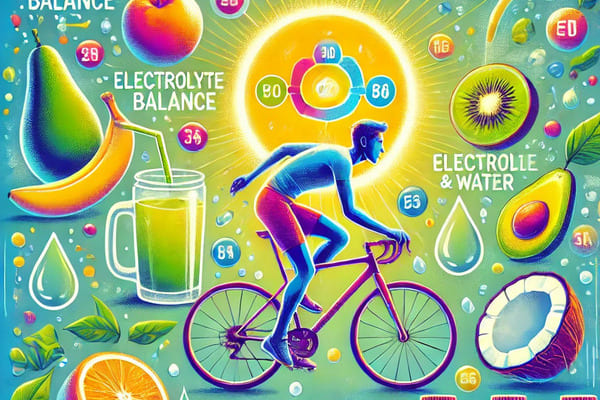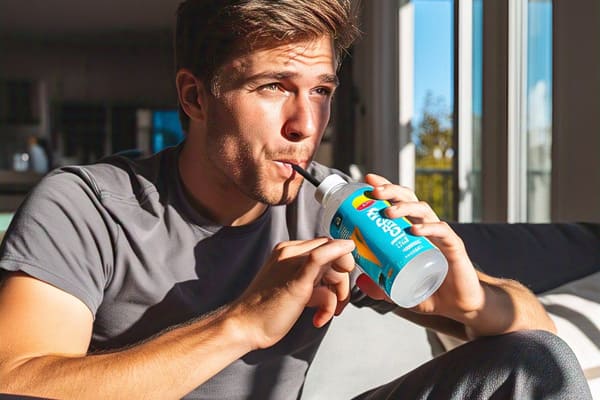Staying hydrated goes beyond drinking water; maintaining electrolyte balance is crucial for optimal performance. Electrolytes like sodium, potassium, calcium, and magnesium regulate nerve function, muscle contraction, and fluid balance. Without proper electrolyte levels, fatigue, muscle cramps, and cognitive fog can set in — even if you’re drinking plenty of water. Here’s how to balance electrolytes for peak performance:

Why Electrolytes Matter for Hydration and Performance
Electrolytes are essential minerals that carry an electric charge, helping regulate crucial bodily functions. They control fluid balance, muscle contractions, and nerve impulses. Without proper electrolyte balance, the body struggles to retain water, resulting in dehydration. This imbalance can lead to fatigue, dizziness, muscle cramps, and even cognitive issues.
For athletes, losing electrolytes through sweat without replenishment can severely impact endurance and recovery. Proper electrolyte management is key to maintaining energy levels, improving focus, and preventing performance dips during physical exertion.
Effects of Electrolyte Imbalance
An imbalance can manifest in various ways. Sodium deficiency may cause headaches, confusion, and muscle weakness. Low potassium levels may trigger fatigue, irregular heart rhythms, and muscle cramps. Calcium deficiencies can impair muscle contractions, while magnesium imbalance may result in muscle spasms and reduced stamina. Recognizing these signs early allows for corrective steps to restore balance.
Recommended Electrolytes Per Day
For optimal health, the recommended daily electrolyte intake is approximately 2,300 mg of sodium, 3,500-4,700 mg of potassium, 1,000 mg of calcium, and 310-420 mg of magnesium. These values may vary based on age, activity levels, and dietary needs.
How to Balance Electrolytes in Body for Peak Performance
Prioritize Potassium-Rich Foods
Potassium plays a key role in balancing sodium levels and supporting muscle function. Foods like bananas, avocados, sweet potatoes, and spinach are excellent sources. According to the National Institutes of Health, adults should aim for about 3,500-4,700 mg of potassium daily to maintain optimal hydration and heart health. Incorporating potassium-rich foods into your diet can prevent muscle fatigue and cramping, especially during intense workouts.
Incorporate Sodium Strategically
While sodium often gets a bad reputation, it’s essential for maintaining fluid balance and preventing dehydration. Athletes and those with active lifestyles lose sodium through sweat, making replenishment critical. Studies suggest that individuals exercising for over an hour should consume sodium-rich snacks or electrolyte drinks to sustain performance. Adding a pinch of sea salt to water or eating salted nuts can help restore sodium levels safely.

Embrace Magnesium for Muscle Recovery
Magnesium supports over 300 bodily functions, including muscle repair and nerve function. Research from the American Journal of Clinical Nutrition highlights that magnesium deficiency can impair exercise performance and recovery. Leafy greens, almonds, and pumpkin seeds are magnesium-rich foods that can help regulate hydration levels and reduce post-exercise soreness.
Hydrate with Electrolyte-Enhanced Drinks
Water alone may not be enough to maintain electrolyte balance, especially during prolonged exercise. Electrolyte drinks designed for hydration provide optimal sodium, potassium, and magnesium ratios. According to a 2022 study published in the Journal of Sports Science & Medicine, electrolyte drinks improve endurance and reduce the risk of dehydration more effectively than plain water during intense workouts.
Monitor Calcium for Fluid Regulation
Calcium is often overlooked when discussing hydration, yet it’s vital for muscle contraction and nerve signaling. Dairy products, fortified plant-based milk, and leafy greens are excellent calcium sources. According to research published in Nutrients, adequate calcium intake reduces the risk of muscle spasms and enhances overall hydration during physical exertion.
Don’t Overlook Coconut Water
Coconut water is a natural electrolyte powerhouse. Rich in potassium, magnesium, and sodium, it’s an effective hydration solution after workouts or illness. A study in the Journal of the International Society of Sports Nutrition found that coconut water replenishes fluids as efficiently as sports drinks but with fewer calories and added sugars. This makes it an excellent choice for everyday hydration.
Track Your Electrolyte Needs Based on Activity Levels
Electrolyte needs vary significantly based on activity type and duration. Endurance athletes, for example, require higher sodium and potassium levels to maintain performance, while casual exercisers may only need minimal adjustments. Tracking sweat rates or consulting a sports nutritionist can help tailor your electrolyte intake effectively.
Limit Overhydration to Avoid Imbalance
Drinking excessive amounts of water without replenishing electrolytes can dilute sodium levels, leading to hyponatremia — a potentially dangerous condition. According to a study in the British Journal of Sports Medicine, consuming electrolyte drinks during endurance events can reduce the risk of water intoxication. Balancing water intake with proper electrolyte replenishment is key to avoiding electrolyte imbalance.

FAQs on How to Balance Electrolytes in our Body:
How to Balance Electrolytes on Keto?
The ketogenic diet can deplete key electrolytes due to reduced carb intake and increased water loss. To maintain balance, increase sodium intake with bone broth or salted foods, consume potassium-rich vegetables like spinach, and include magnesium sources such as almonds. Electrolyte supplements designed for keto diets can also help maintain optimal hydration.
How to Measure Electrolytes in Energy Drinks?
To measure the amount of electrolytes in a drink, check the nutrition label for sodium, potassium, calcium, and magnesium content. Energy drinks designed for hydration often display these values per serving, helping you track your intake. For precise measurements, specialized electrolyte test strips can provide a clearer picture of your drink’s electrolyte content.
How Much Electrolytes Do I Need for Cycling?
Cyclists may require 500-700 mg of sodium, 200-300 mg of potassium, and 20-50 mg of magnesium per hour of intense riding, depending on sweat rates and environmental conditions. Tailoring electrolyte intake based on ride duration and exertion levels can enhance endurance and recovery.
Do Electrolytes Help with Performance?
Yes, electrolytes support muscle function, nerve signaling, and hydration. Maintaining proper electrolyte levels can boost endurance, reduce fatigue, and prevent muscle cramps during intense exercise or prolonged physical activity.
How Do You Maintain Electrolyte Balance in Your Body?
Eat a balanced diet with potassium, sodium, calcium, and magnesium-rich foods. Hydrate regularly and use electrolyte drinks during intense exercise or hot weather to maintain balance.
How Does the Body Balance Electrolyte Levels?
The body regulates electrolytes through the kidneys, which filter excess minerals and adjust levels to maintain optimal fluid balance, nerve function, and muscle activity.
What Are 5 Symptoms of Electrolyte Imbalance?
Symptoms include muscle cramps, dizziness, fatigue, irregular heartbeat, and headaches. Severe imbalance can lead to confusion, weakness, or even seizures in extreme cases.
Do Electrolytes Increase Stamina?
Yes, maintaining electrolyte balance helps sustain energy levels, improves endurance, and prevents dehydration, reducing fatigue during prolonged physical exertion.
How to Maintain Electrolytes While Fasting?
Consume electrolyte-rich foods before fasting, such as avocados and nuts. During fasting, mineral drops in water or electrolyte supplements can help maintain balance.
Balancing Electrolytes is Essential
Balancing electrolytes is essential for optimal hydration, improved energy levels, and enhanced recovery. By incorporating potassium-rich foods, embracing sodium strategically, and leveraging electrolyte drinks when needed, you can maintain peak performance. Understanding your body’s hydration needs will help you stay energized and perform at your best, whether you’re training for a marathon or simply powering through a busy day.




